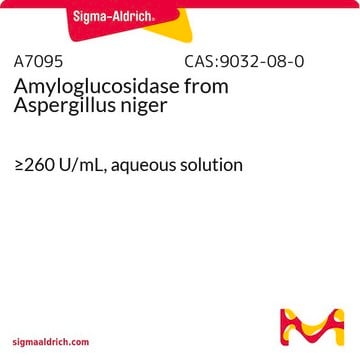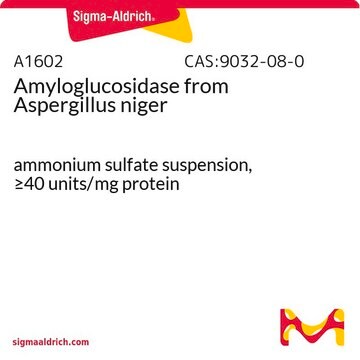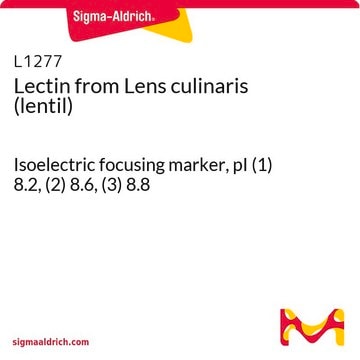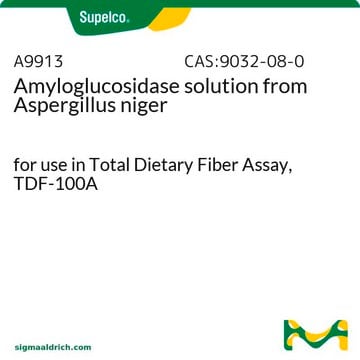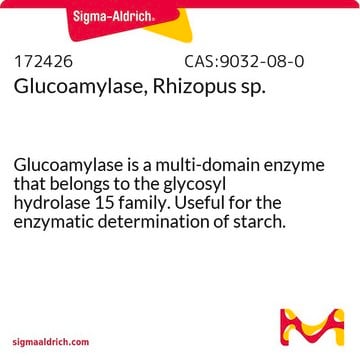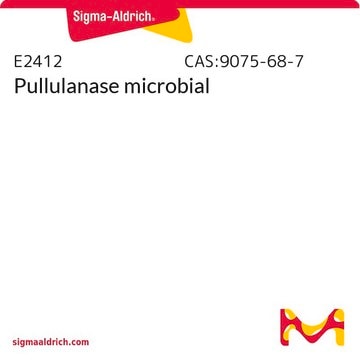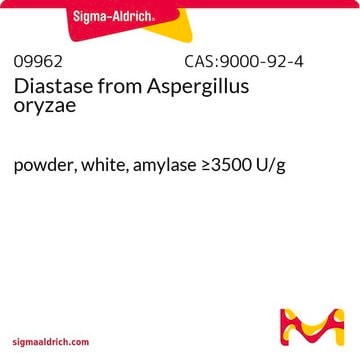A2910
Amyloglucosidase from Aspergillus niger
Isoelectric focusing marker, pI 3.6
Synonym(s):
1,4-α-D-Glucan glucohydrolase, Exo-1,4-α-glucosidase, Glucoamylase
Sign Into View Organizational & Contract Pricing
All Photos(1)
About This Item
Recommended Products
Looking for similar products? Visit Product Comparison Guide
Biochem/physiol Actions
Amyloglucosidase is an exoenzyme which catalyzes the hydrolysis of starch at α-1,4 glycosidic bonds to glucose. It also acts on the α-1,6 linkages and is used along with amylase for effective starch digestion. Use of amyloglucosidase enhances fermentation in bread production. It is widely used in baking, as natural sweetener and in detergent production.
Signal Word
Danger
Hazard Statements
Precautionary Statements
Hazard Classifications
Resp. Sens. 1
Storage Class Code
11 - Combustible Solids
WGK
WGK 3
Flash Point(F)
Not applicable
Flash Point(C)
Not applicable
Personal Protective Equipment
dust mask type N95 (US), Eyeshields, Gloves
Certificates of Analysis (COA)
Search for Certificates of Analysis (COA) by entering the products Lot/Batch Number. Lot and Batch Numbers can be found on a product’s label following the words ‘Lot’ or ‘Batch’.
Already Own This Product?
Find documentation for the products that you have recently purchased in the Document Library.
Customers Also Viewed
Use of alpha-amylase and amyloglucosidase combinations to minimize the bread quality problems caused by high levels of damaged starch
Barrera G, et al.
Journal of Food Science and Technology, 53(10), 3675-3684 (2016)
Purification and characterization of an amyloglucosidase from an ericoid mycorrhizal fungus (Leohumicola incrustata)
Adeoyo OR, et al.
AMB Express, 8(1), 154-154 (2018)
Amyloglucosidase enzymatic reactivity inside lipid vesicles
Li M, et al.
Journal of Biological Engineering, 1(1), 4-4 (2007)
P M Nunes et al.
American journal of physiology. Endocrinology and metabolism, 303(1), E71-E81 (2012-04-13)
Adipose triglyceride lipase (ATGL) is a lipolytic enzyme that is highly specific for triglyceride hydrolysis. The ATGL-knockout mouse (ATGL(-/-)) accumulates lipid droplets in various tissues, including skeletal muscle, and has poor maximal running velocity and endurance capacity. In this study
Ted J Langan et al.
Electrophoresis, 33(4), 607-613 (2012-03-28)
For the first time, a semi-permanent phospholipid coating is utilized in capillary electrophoresis-electrospray ionization-mass spectrometry (CE-ESI-MS). Although phospholipids in free solution are generally avoided in ESI, they did not interfere with the detection of linear and branched oligosaccharides using ESI
Our team of scientists has experience in all areas of research including Life Science, Material Science, Chemical Synthesis, Chromatography, Analytical and many others.
Contact Technical Service